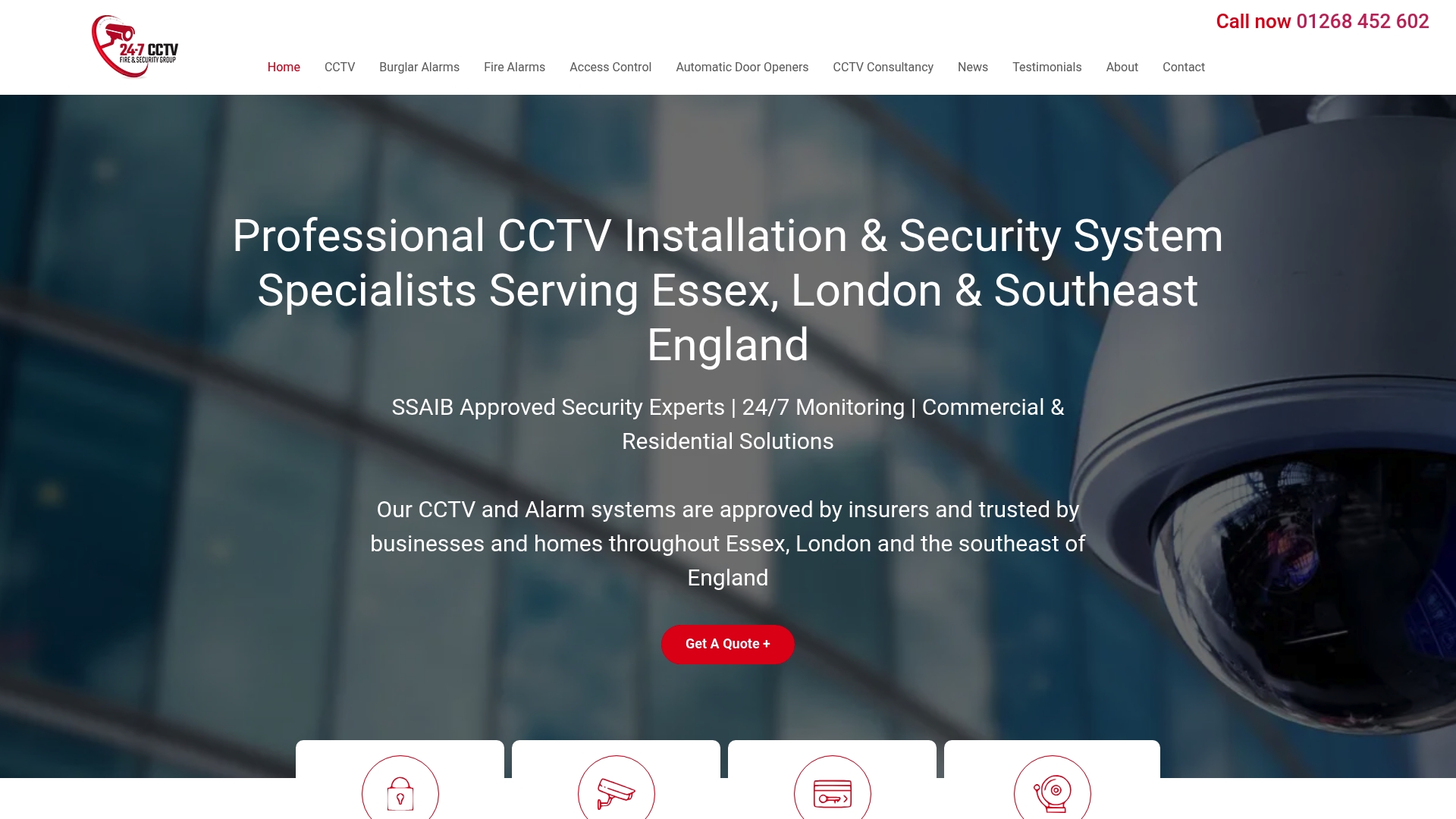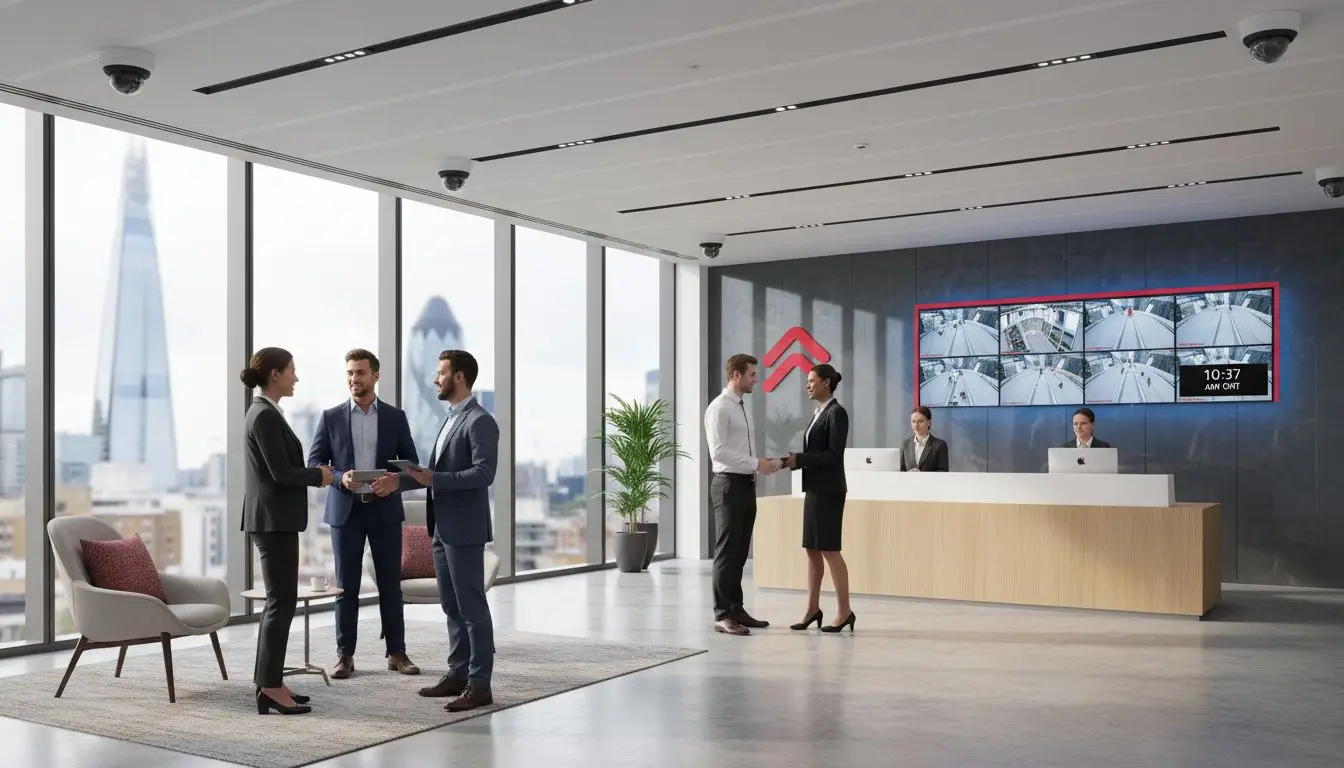Nearly 90 percent of UK businesses rely on CCTV to help protect their premises and people. Security threats can strike at any time, making robust surveillance vital for business owners and managers. From small shops to large office blocks, the right commercial CCTV system provides stronger protection, lowers risk, and helps build trust among staff and clients alike.
Table of Contents
- What Are Commercial CCTV Systems?
- Key Types Of CCTV Solutions For Businesses
- How Commercial CCTV Systems Operate
- UK Legal And Compliance Requirements For CCTV
- Costs, Risks And Best Practice Considerations
Key Takeaways
| Point | Details |
|---|---|
| Advanced Technology Integration | Commercial CCTV systems utilize high-resolution cameras, intelligent motion detection, and remote monitoring to enhance security. |
| Legal Compliance is Essential | Businesses must adhere to the Data Protection Act and maintain transparency in their surveillance activities. |
| Diverse Solutions Available | Options vary from IP CCTV to thermal cameras, allowing businesses to select systems tailored to specific security needs. |
| Cost Considerations | Businesses should account for equipment, installation, maintenance, and compliance costs when planning a CCTV investment. |
What Are Commercial CCTV Systems?
Commercial CCTV systems are sophisticated video surveillance networks designed specifically for businesses to monitor, protect, and secure their physical premises. According to the gov.uk, these systems are comprehensive surveillance camera setups used to detect potential threats, prevent crime, and maintain a secure environment for employees, customers, and assets.
At their core, these systems go far beyond simple recording. Modern commercial CCTV solutions integrate advanced technologies like high-resolution cameras, intelligent motion detection, remote monitoring capabilities, and data analytics. Unlike residential security systems, commercial CCTV is engineered to handle complex surveillance requirements across diverse business environments – from retail shops and warehouses to office complexes and industrial facilities.
The credibility of commercial CCTV installations is critically maintained through professional certifications. The National Security Inspectorate plays a pivotal role in the UK by certifying companies that install and maintain these systems, ensuring they meet rigorous industry standards. This certification process guarantees that businesses receive professionally implemented security solutions that comply with legal and technical requirements.

Key characteristics of commercial CCTV systems include:
- Multi-camera network coverage
- High-definition video recording
- Night vision capabilities
- Cloud storage and remote access
- Intelligent motion tracking
- Immediate alert notifications
By integrating a robust commercial CCTV system, businesses can significantly enhance their security infrastructure, deter potential criminal activities, and create a safer working environment.
Key Types Of CCTV Solutions For Businesses
Businesses today have access to a diverse range of CCTV surveillance technologies tailored to specific security requirements. According to safeguardsystems.co.uk, companies can choose from multiple advanced solutions including IP CCTV for high-resolution imaging, thermal cameras for challenging low-light environments, and Automatic Number Plate Recognition (ANPR) systems for vehicle tracking and monitoring.
Traditional surveillance technologies have dramatically evolved, offering businesses sophisticated options beyond basic recording. PHS Compliance highlights the spectrum of solutions ranging from classic analogue systems to cutting-edge IP-based cameras. These modern systems provide comprehensive features like remote monitoring capabilities, seamless integration with broader security infrastructures, and advanced data management.
The primary commercial CCTV solutions include:
Here’s a summary of the main types of commercial CCTV solutions and their core benefits:
| CCTV Type | Key Features | Typical Applications |
|---|---|---|
| IP CCTV Systems | High-res imaging Remote access | Offices Retail Warehouses |
| Analogue CCTV | Wired reliability Cost-effective | Small businesses Industrial sites |
| Thermal Imaging Cameras | Detect heat Low-light performance | Perimeter security Factories |
| ANPR Systems | Number plate recognition Automated tracking | Car parks Logistics sites |
| Wireless CCTV | Flexible setup Minimal wiring | Temporary sites Shops |
| High-Definition Cameras | Detailed surveillance Enhanced clarity | Banks High-end retail |
- IP CCTV Systems: Network-connected cameras offering superior image quality
- Analogue CCTV: Traditional wired cameras with reliable performance
- Thermal Imaging Cameras: Specialized for detecting heat signatures
- ANPR Systems: Designed for vehicle identification and tracking
- Wireless CCTV: Flexible installation with minimal infrastructure requirements
- High-Definition Cameras: Ultra-clear imaging for detailed surveillance
By understanding these diverse commercial CCTV options, businesses can strategically select security solutions that precisely match their unique operational environments and protection needs.
How Commercial CCTV Systems Operate
Commercial CCTV systems function through a sophisticated network of interconnected technologies designed to capture, transmit, and analyze video surveillance. According to the gov.uk, these systems operate by strategically positioning cameras to capture video footage, which is then transmitted to centralized monitoring stations for real-time observation and comprehensive recording.
The technical infrastructure of modern commercial CCTV systems is remarkably advanced. HDcctv technologies have revolutionized video transmission, enabling uncompressed high-definition video streaming over coaxial cables. This approach ensures low-latency transmission and exceptionally high-quality imagery, critical for detailed security monitoring across diverse business environments.
The operational workflow of commercial CCTV systems typically involves several key stages:
- Camera Placement: Strategic positioning to maximize coverage
- Video Capture: High-resolution image recording
- Data Transmission: Secure signal transfer to monitoring centers
- Storage: Digital archiving of footage
- Analysis: Intelligent tracking and threat detection
- Remote Access: Real-time monitoring from multiple devices
Businesses can enhance their security protocols by understanding key CCTV system features, ensuring comprehensive protection and proactive threat management across their operational spaces.
UK Legal And Compliance Requirements For CCTV
Navigating the legal landscape of commercial CCTV in the UK requires a comprehensive understanding of strict regulatory frameworks. According to gov.uk, businesses must ensure their CCTV systems comply with the Data Protection Act, which mandates that surveillance is conducted lawfully, fairly, and with complete transparency.
The regulatory environment for CCTV is complex and multifaceted. Wikipedia’s Surveillance Camera Code of Practice provides critical guidelines emphasizing privacy protection and institutional accountability. This means businesses must carefully balance their security needs with individuals’ right to privacy, implementing surveillance systems that are proportionate, necessary, and minimally intrusive.
Key legal compliance requirements for commercial CCTV systems include:
- Data Protection Registration: Mandatory notification to the Information Commissioner’s Office
- Purpose Limitation: Clear, legitimate reasons for surveillance
- Data Minimisation: Collecting only necessary footage
- Storage Restrictions: Limited retention periods
- Individual Rights: Providing access to recorded footage upon request
- Clear Signage: Visible warnings about camera monitoring
Businesses seeking to navigate these complex regulations can benefit from understanding local CCTV regulations, ensuring they remain compliant while maintaining robust security protocols.

Costs, Risks And Best Practice Considerations
Implementing a commercial CCTV system involves strategic financial planning and comprehensive risk management. According to gov.uk, businesses must carefully consider the costs associated with equipment, installation, and ongoing maintenance, while simultaneously developing robust strategies to mitigate potential risks such as data breaches and system vulnerabilities.
The financial investment in commercial CCTV infrastructure extends beyond initial hardware purchases. Professional installation, regular maintenance, potential upgrades, and compliance management contribute to the total cost of ownership. The National Security Inspectorate emphasizes that engaging certified professionals can significantly reduce long-term risks by ensuring systems meet rigorous industry standards and performance benchmarks.
Key considerations for businesses include:
- Initial Equipment Costs: Camera systems, storage solutions, networking hardware
- Installation Expenses: Professional setup and configuration
- Ongoing Maintenance: Regular system checks and potential repairs
- Data Storage Infrastructure: Secure digital storage solutions
- Compliance Management: Legal and regulatory adherence costs
- Cybersecurity Investments: Protecting against digital vulnerabilities
Businesses can strategically manage their CCTV investments by understanding key system features, ensuring they balance comprehensive security with cost-effective implementation.
Secure Your Business with Expert Commercial CCTV Solutions
Understanding the complexity of commercial CCTV systems can be overwhelming, especially when it comes to ensuring legal compliance, advanced technology features, and reliable installation. Many businesses struggle with choosing the right security setup that delivers clear, high-definition surveillance without compromising privacy or breaking the budget. From sophisticated IP cameras to thermal imaging and ANPR systems, every solution comes with unique benefits and challenges that must be carefully considered for effective protection.
At 247cctv.co.uk, we understand these pain points and specialise in delivering tailored CCTV installations that meet your precise business needs while adhering to UK legal requirements. Our team provides professional advice and expert installation services designed to optimise coverage, incorporate the latest technology, and secure your premises with integrity. Whether you require advanced monitoring capabilities or seamless integration of access control, our reliable service ensures you gain peace of mind and robust protection.
Discover how we can help safeguard your business today with a free consultation.

Take control of your security with a commercial CCTV system installed by trusted experts. Visit 247cctv.co.uk now and get started with a solution tailored to protect what matters most.
Frequently Asked Questions
What are commercial CCTV systems?
Commercial CCTV systems are sophisticated video surveillance networks designed for businesses to monitor and secure their premises, offering features like high-resolution images and remote access.
How do commercial CCTV systems operate?
Commercial CCTV systems operate by strategically positioning cameras to capture video footage, which is then transmitted to centralized monitoring stations for real-time observation and recording.
What are the main types of CCTV solutions available for businesses?
The main types of CCTV solutions for businesses include IP CCTV systems, analogue CCTV, thermal imaging cameras, ANPR systems, wireless CCTV, and high-definition cameras, each tailored for specific security needs.
What legal compliance requirements must businesses follow for CCTV usage?
Businesses must comply with the Data Protection Act, ensuring lawful surveillance practices, clear purpose limitation, data minimization, and proper signage about monitoring in their CCTV usage.

